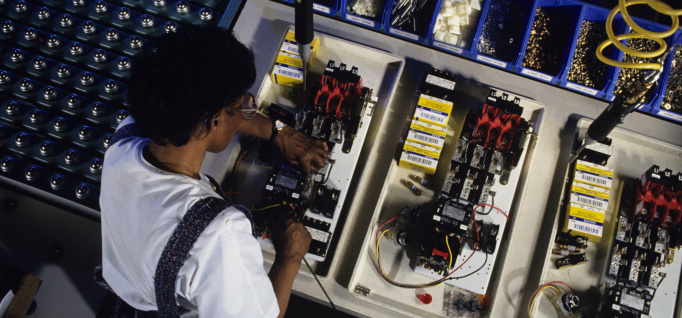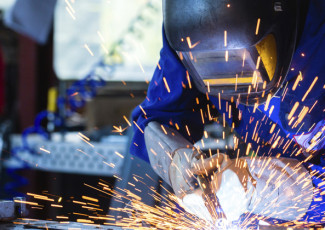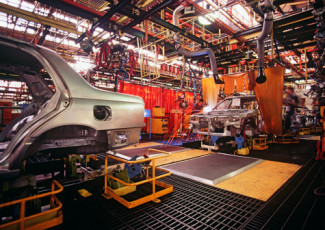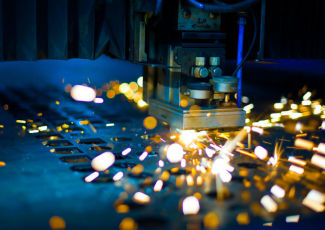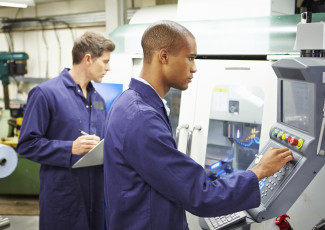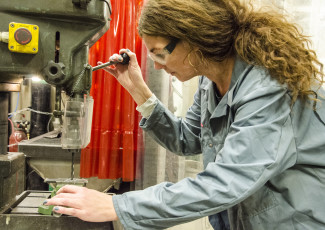A Bright Future in Manufacturing
By AACC Staff
December 5, 2014
Community colleges’ advanced manufacturing centers are delivering critically needed trained workers to local industries.
The middle-skills gap is a stubborn workforce problem that community colleges across the country are attacking in a number of different ways. Case in point: An increasing number of community colleges are partnering with local industries to create advanced manufacturing centers, which offer real-world factory training. Through these centers, community colleges are providing employers with skilled workers who can hit the ground running and offering students with pathways to promising careers.
What follows is an excerpt of an article that first appeared in AACC’s Community College Daily on advanced manufacturing centers at three different community colleges, including the $8 million center at Everett Community College in Washington.
The new $8-million advanced manufacturing center opened by Everett Community College (EvCC) last month is one of many such centers created by community colleges nationwide to respond to a growing need for trained factory workers.
The new center is expected to help close a significant skills gap in the area, due to a huge wave of retirees expected at Boeing and other companies, while new workers will need more advanced skills training.
That’s a story shared by other community colleges who have recently opened similar centers or are planning to do so.
“It’s absolutely on the increase,” Nicholas D’Antonio, program manager for student and youth engagement at the Manufacturing Institute, said of the number of advanced manufacturing centers opening at public two-year colleges.
The Manufacturing Institute, an affiliate of the National Association of Manufacturers, supports these programs through advocacy at the national and state level, endorsing nationally recognized credentials and encouraging youths to choose manufacturing careers through the Dream It, Do It initiative.
State organizations in the Dream It, Do network provide resources to manufacturing education programs, including plant tours, workshops, summer camps and job shadowing for community college and high school students.
“Public perception is a challenge,” D’Antonio acknowledges, noting that people still view manufacturing as dirty, dangerous work. “We are making progress slowly.”
Students might not know anything about manufacturing, “but when you expose them to it, there’s a strong chance they will pursue a career in manufacturing,” he said. “We need to reach that critical mass.”
Turning the corner?
That’s a challenge in Washington state, despite a strong outlook for manufacturing jobs. It’s still hard to convince high school guidance counselors and parents that factory work isn’t only for the unskilled, said John Bonner, director of corporate and continuing education at EvCC. The college is working with school districts, parents and employers to help prospective students understand that today’s plants are clean and efficient with cutting-edge technology, and they need workers with advanced knowledge of technology.
That effort is paying off. Last year, 900 students were enrolled in the college’s manufacturing programs. This year, with the new center up and running, Bonner expects enrollment to reach 1,000 and anticipates continued growth.
Much of that expansion is due to the production of new 777X planes at the nearby Boeing plant, which is having a ripple effect at other aerospace companies in the area, including Zodiac Aerospace, Aviation Technical Services and Primus International.
“The opportunities in aerospace are unprecedented,” he said. “It’s a huge driver of the local economy.”
More than just aerospace
It’s not all about aerospace, though. The area is also home to Fluke Corp., which makes biomedical equipment and other products; Terex, which manufacture construction equipment; the Vigor Industrial shipbuilding and repair company, and many other manufacturers.
EvCC’s Advanced Manufacturing Training and Education Center (AMTEC) serves more than 200 manufacturing employers by providing training for computer numerical control (CNC) machinists, aerospace composites technicians, engineering technical designers, welders/fabricators and quality assurance technicians.The center also offers an introductory course leading to a National Career Readiness Certificate qualifying them for an entry-level job.
The college received a two-year, $800,000 grant from the National Science Foundation’s Advanced Technological Education program to support staffing and curriculum development for the center. EvCC also used $1.2 million in donations from industry, along with revenue from customized training programs, other grants and college reserve funds to develop the center.
AMTEC’s goal is to replicate a factory floor to train students on the complete manufacturing life cycle – from computer-aided design, to choosing materials, production planning, quality control and the use of 3D printers to create prototypes and products. Giving students exposure to the latest manufacturing equipment “makes students more employable and more valuable,” Bonner said.
Ninety percent of students who earn a professional certificate in manufacturing are placed in a job within 30 days. Learning takes place in cross-functional teams, with an emphasis on communications, problem solving and critical thinking – “covering all those skills employers tell us they want,” Bonner said. It’s all done through contextualized learning with students working on problems they will face in the workplace.
To read about the advanced manufacturing centers at Community College of Denver and Housatonic Community College in Connecticut, check out the full story in AACC’s Community College Daily.


